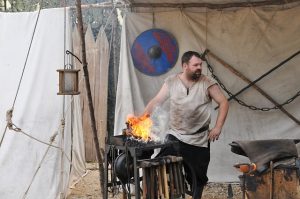It’s Only Make Believe
Here’s a new story about the Middle Ages, well, about the recreation of the Middle Ages, to be exact. While these events didn’t happen, they perhaps should have, as everything else in the story is accurate. The names of the participants have been changed, slightly, to protect the guilty…errrr…their identities. Though, if you’d been there, you’d know who this cast of characters is based on.
We hope you enjoy this historical misadventure!
Image by Meromex
IT’S ONLY MAKE BELIEVE
“Remember, it’s only make-believe,” I muttered through clenched teeth for the umpteenth time, as I pulled the guy wires tight.
Why couldn’t the rest of them remember that? Today, for example, whoever arranged this mess completely disregarded common sense and helpful suggestions from those of us who really did know the way things worked best, and had—again—put merchants row in the back of beyond, in the dustiest, most remote, area of the campground.
Oh well, I guess I’ll just have to make the best of it. Like always.
Wiping my forehead on my tunic sleeve, I stood back to admire the crenelated awning across the front of my pavilion. I’d spent hours sewing the burgundy and cornflower sheets the previous week and it looked perfect.
Around me, the other merchants were setting up their own pavilions and wares, a lengthy task that, for some, wouldn’t be completed until way after dark, even on these long summer days.
Then the shouting began. I dashed out of my pavilion to see what all the fuss was about.
“Who do they think they are, anyway?” Anna harumphed.
“The merchantcrat told me,” Peggy said, hobbling up to the circle of merchants that was forming, “that the king moved our location on the set-up chart himself.”
“That’s the last straw!” Otto said, stamping his foot.
“Did they ever stop to think about what they’d do without us?” I asked.
Silence followed my remark, as the idea took root and sprouted. A plan was hastily hatched. Soon, we were all in agreement and went our separate ways.
Morning came and all of our gaily colored and bannered booths were open and ready for business. Strolling nobles, coffee in hand, wandered the row, seeking that special irresistible item of jewelry, candle, armor, toy, or book that would complete their households or buy for a lady’s favor or replace a broken or forgotten item.
Then the cries of shock began.
“What!”
“You’ve got to be kidding!”
“But I have money right here…”
On and on and on.
Word spread even faster than a running squire. Suddenly, merchant’s row, formerly the back of beyond, was the place to be.
Knights still belting on swords, ladies clutching tilted hats, children racing about, peers of the realm, and then finally, the king and queen appeared.
“What’s the meaning of this,” the king roared.
The populace fell silent, eyes darting about, waiting for someone to answer their angry monarch.
The man who stepped forth from the crowd wasn’t tall, but none among the men would dare to challenge the master swordmaker, martial artist and merchant. Grizzled hair fringed his head and his tunic and trews were brown and utilitarian, stained from forge work and holed here and there from flying sparks.
Coming to a halt before the king, he bowed slightly, asking, “May I help you, Your Highness?”
“Otto, what’s the meaning of,” He gestured around. “all of this? My chamberlain says none of the merchants will sell to him, or anyone else for that matter. Can you explain this to me?” the man demanded, planting his fists on his hips.
Otto considered a moment, scratching his sparse chin whiskers. The silence stretched out until I thought I might blurt something out just to break the tension.
The smith looked up, the steel that he worked with showing in his eyes.
“Sire,” he began mildly, “we merchants have been loyal subjects of this kingdom, some of us for over two decades. In that time, we’ve contributed prizes and awards for the crown to give away, paid our fees without complaint, and served as first contact for thousands of mundanes and new members.” He paused, glancing briefly down at the burnt brown summer grass, then back up at the king.
“And what do we get in return, Your Highness? Well, since I seem to have your undivided attention, I’ll tell you….” he said, his voice trailing off.
“We. Get. Shit. On!” he roared.
The crowd gasped and even the king rocked back at the vehemence Otto put into his words.
“But…but…what…” the king stammered, then stopped as Otto held up a silencing finger.
Looking at the ring of merchants and populace surrounding them, Otto nodded to a plump, grey-haired woman dressed in an Anglo Saxon tunic and skirt. Peggy lurched forward on uneven legs, then bobbed an awkward curtsey to the king before speaking.
“Your Highness, please look around you. Where are the port-a-potties? I’ll tell you—a good ten-minute walk over uneven ground, across a field and through the Red Rocks encampment.” She pulled up her voluminous skirt, exposing an artificial leg. “In case you haven’t noticed, several of us merchants are mobility impaired. But no matter how often we request setting up near the port-a-potties, we seldom are.” She brazenly turned her back on the king and limped back to her place on the circle.
Otto then nodded to Anna the Confused, a plump woman in beautiful highland garb. She strode forward, bowed, then briefly laced her hands beneath her ample bosom, lifted to adjust herself, and began.
“Highness, we merchants have been contributing members to our organization for decades. I myself was one of the first five merchants in this kingdom. Like many others here,” She gestured to the others at her back. “I have researched the historical accuracy of my,” She ticked them off on her fingers. “jewelry designs, encampment, garb, and behavior, all to make my contribution the best it can possibly be, so we can all enjoy our events. I’ve gladly given prizes for all kinds of competitions. I work endless hours between events to create my wares, one of which you are wearing right now,” she said, pointing to his silver cloak clasp. “And we have seldom received a word of commendation, much less any of the awards that seem so freely passed out in your court.”
She finished rather defiantly, her chin proudly raised. With the very slightest of bows, she backed from the circle.
There was silence. Another one of the sword makers, Proteus, jostled my elbow. “Ummm…M’Lady Hunter?”
The smith was pointing at me!
“Who, me?” I asked, raising my eyebrows. I couldn’t speak for all the other merchants.
“Yes, you,” Otto said, a slight smile on his face.
I blinked, suddenly glad I’d decided to wear my best white chemise and black surcoat, even if it caught occasionally on the dry grass. I bowed nervously, my long hair briefly veiling my face.
“Um,” I started uncertainly, “most of us merchants consider ourselves to be citizens-at-large of your kingdom. For a number of reasons, we no longer associate with the local shires or baronies in your fair land. Don’t get me wrong, most of us tried to fit in with those we lived near, but usually only for a short time. It’s a common experience with us that our contributions are denigrated and we are looked down upon, since,” I held up my fingers and made air quotes. “‘everyone knows that merchants prey upon the populace.’ That attitude, whether verbalized or not, has come down from above—from you, M’Lord! I even had one seneschal tell me that we should take a class to learn how to deal with the moderns who ask questions about our group’s aims and practices.”
I paused to draw a deep calming breath before I continued. What the hell, in for a penny, in for a pound! “Your highness, we’ve been made to feel like bastard children in your kingdom, and we resent it. Look around you. Without us, where would your fine clothes come from? Your tankards and platters and feastware? Your jewelry?” I flung up my hands. “Hell, even your swords and armor? Are you ready to spend the hours upon hours necessary to learn the skills required to make everything you use and wear on the weekends? If so, maybe you should join the mountain man’s organization.”
I felt my face heat up as the rest of the merchants laughed. I bowed and withdrew as fast as I could without tripping.
Otto waited patiently for the laughter to die down. Then he waved his hands to get everyone’s attention and turned back toward the king.
“Your Highness, these people have told you some of the problems we have, but by no means all. No one spoke of trying to display her wares on badly tilting ground, because merchants’ row was given the worst land at an event. No one complained how our pavilions get placed in treeless areas, broiling the day away, while the populace’s unoccupied tents reside in the shade. No one mentioned the effort we make to present a period face that contributes to the illusion of the Middle Ages we’re recreating. No one spoke of the amount of time each craftsman takes to learn and polish the techniques necessary to provide you with garb, jewelry, instruments, feast gear, armor, and cutlery, not to mention the cost of tools and workspace needed. Our craft people are also teachers, who eagerly pass on their knowledge to others. Though few seem to be considered worthy by the crown to teach in Your Majesty’s ithras.” Otto stopped, his shoulders slumping briefly as he shook his head. “Why is that?”
The king opened his mouth to reply, but Otto held up a silencing finger. “I’m not done yet, Sire.
“We’ve tried for years to get your attention, but nothing worked. So today we set ourselves up as we always do, even though we were given the worst area of the campground, once again, far from the fighting and the court. However, this time, we won’t be selling our wares to anyone. You may look all you want, but nobody is selling anything this weekend.
“You may go about your usual activities, and forget us, if you will, but I suggest you spare a thought for the future. What if the merchants just stopped coming to these events? Perhaps we’d come and just watch the event and leave our wares at home. Perhaps we’d find other, more appreciative audiences.”
Otto swept a hand to encompass the merchants gathered behind him.
“Or, maybe, just maybe, we’ll finally see that our presence is wanted, needed, hell, possibly even appreciated.” Otto cast a withering look at the monarch before he turned away, leaving the king standing, mouth agape. As we merchants returned to our pavilions, Otto fired off one last shot over his shoulder.
“It’s up to you, Your Highness. The ball, as they say, is in your royal court.”

